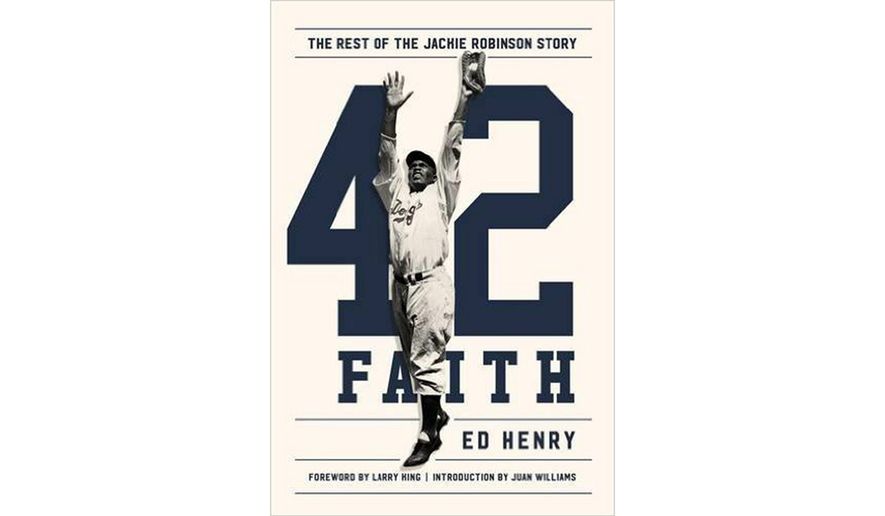OPINION:
42 FAITH: THE REST OF THE JACKIE ROBINSON STORY
By Ed Henry
W Publishing Group (imprint of Thomas Nelson/HarperCollins), $24.99, 333 pages
Jackie Robinson’s inspirational story has long been immortalized in books and movie adaptations. He broke major league baseball’s color barrier on April 15, 1947. He played for the Brooklyn (now Los Angeles) Dodgers from 1947-1956. He won many individual awards, as well as the 1955 World Series, and is a member of the Hall of Fame.
Yet, it appears there’s even more to the story about this remarkable sports hero.
Ed Henry’s book, “42 Faith: The Rest of the Jackie Robinson Story,” reveals that religion played a significant role in keeping Mr. Robinson grounded, focused and determined on the baseball diamond. Fox News Channel’s chief national correspondent used original materials contained at the Library of Congress, including previously unknown sermons, interviews and an unpublished (and revealing) manuscript. Mr. Robinson’s daughter, Sharon, told him that “the family wanted me to use as much material as possible … because her mother donated them to the library so that the public can see his legacy.”
They will, in a whole new light.
During the “ugly days of his time as a Dodger,” according to Mr. Henry, he “leaned on the Bible and his personal faith to get him through.” It was a trait that he shared with Branch Rickey, the team’s owner, who “had his own habit of slipping into churches wherever he traveled.” This shared interest in Christianity served as the foundation for this important relationship that changed the face of the game they both loved.
Mr. Rickey gave Mr. Robinson “a little hint” when they first met that “there was a divine inspiration for his push to integrate baseball.” Mr. Robinson’s unpublished manuscript alludes to Mr. Rickey “talking to me about the promise he had to God and to himself when he was teaching sports at college.” Although this was a reference to Charles “Tommy” Thomas, who “helped shape the executive’s feelings about racial injustice,” the sentiment carried over into his important decision to bring Mr. Robinson to the big leagues.
It’s no secret that Mr. Robinson faced various roadblocks in the quest to desegregate baseball. Clay Hopper, the manager of his minor league team, the Montreal Royals, “openly declared that African Americans were not human beings” in 1946. He was called many vile things in public, from his Army days to his baseball nights. There were also issues with other baseball players, who didn’t want to play with a black man, and even some teammates.
Through it all, he refused to be intimidated.
Again, it was religion that seemed to soothe his shattered nerves. “42 Faith” contains many thought-provoking speeches, interviews and writings that prove Mr. Robinson’s belief in God made him stronger — and a better ball player.
“I am not the most religious person in the world,” he noted in his unpublished manuscript, “I believe in God, in the Bible and in trying to do the right thing as I understand it.” While he expressed certainty “there are many, many better Christians than I,” few could match his ability to turn the other cheek and turn a negative into a positive.
Mr. Robinson also made some interesting comparisons between sports and religion. In his unpublished manuscript, he wrote, “My concept of religion is of people having faith in God, in themselves and in each other and putting that faith into action. If you can find a better example of those four things than a team of sportsmen working as a unit, I’d like to know what it is.”
Meanwhile, there was a “prayer army” (to use Mr. Henry’s phrase) standing with Mr. Robinson. His personal papers include letters from ministers, reverends, churchgoers and others that contain Biblical phrases as well as enormous pride in his accomplishments.
This strong attachment to religion continued well past his retirement.
He told the Southern Christian Leadership Conference in 1962, ” … as the first Negro in the majors, I needed the support and backing of my own people. I’ll never forget what ministers like you who lead [the] SCLC did for me.” As well, in a speech to a church in New Rochelle, N.Y., in 1967, Mr. Robinson noted “I am not out to be anybody’s martyr or hero” — a common theme in his public life — but argued that “[i]f the church of the living God cannot save America in this hour of crisis, what can save us?”
Mr. Henry’s intriguing book has added an important new chapter in Jackie Robinson’s life and career. We now understand the faith that family, friends and fans put in his God-given abilities provided additional strength to his own commitment to faith.
• Michael Taube is a contributor to The Washington Times.




Please read our comment policy before commenting.